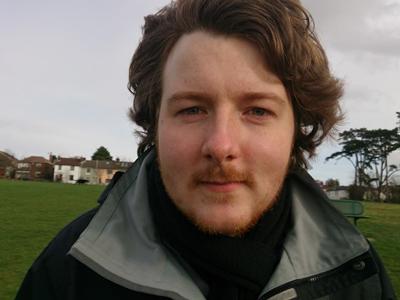Christian Hoggard PhD Archaeology
PhD student

Hi, I'm Christian Hoggard and I studied PhD Archaeology within Archaeology at the University of Southampton.
The Centre for the Archaeology of Human Orgins provides an excellent opportunity for all people's research on Early Prehistory to excel and become of the highest calibre.
My name is Christian Hoggard and I am from North Staffordshire, United Kingdom
What was your first degree in? Where did you study it?
My first degree was in Archaeology, also at the University of Southampton. I then followed this up by undertaking the University's MA in Palaeolithic Archaeology and Human Origins.
What made you decide to study archaeology at postgraduate level?
The desire to understand more about the discipline of Archaeology, both its practical and theoretical aspects, encouraged me to study at postgraduate level. I believe the behaviour of our human ancestors is essential for a better understanding of ourselves today and that this can be best achieved through Archaeology. These aspects, in addition to a desire to contribute and give back to the subject, drive me through my PhD today.
Why did you choose to study at Southampton?
The University of Southampton featrues one of the largest centres for studying the Palaeolithic, the Centre for the Archaeology of Human Origins (CAHO). CAHO is an excellent centre for the research into our human past, with great networking opportunities and a variety of experts within the department. All of this is centred around the well-equipped and excellently resourced John Wymer Laboratory.
Away from the department, Southampton is close to other institutions (Oxford, London etc) and situated on the amazing South Coast making Southampton an ideal place of study.
Tell us more about the areas of archaeology that you are now specialising in.
My research is centred around the analysis of Palaeolithic stone tool assemblages, amongst Neanderthal populations, and examiners aspects of technological variability. Using a variety of methods (including experimental studies) I am particularly interested in understanding: Why were several strategies used by Neanderthals? How were they used? Are there any chronological trends throughout the Middle Palaeolithic?
I am also interested in the importance of altervative (especially 3D) methods of recording stone tool artefacts e.g. 3D printing.
Are you enjoying your studies? What do you like most about your degree programme?
I am almost a year in to my PhD and I am thoroughly enjoying every day of it. What I like most about my PhD is the amount of opportunities to interact with other postgraduates and academics, and the many experiences as a result of these opportunites.
Do you get on well with the academic staff?
I believe so! The members of staff at the University of Southampton are friendly, approachable and incredibly enthusiastic towards people interested in Archaeology. I was surprised by how informal and friendly the academic/student relationship is!
What's the best thing about living and studying in Southampton?
The best thing about living and studying in Southampton is that it has allowed me to be truly mature and independent away from Staffordshire, but yet Southampton still provides a feeling as if I am home. It is also really close to a variety of destinations and institutions: everything is on your doorstep!
What are you planning to do after graduating?
After completing my PhD I am hoping to continue my research, through post-doctoral research, and (hopefully!) become a lecturer within the department.
Do you have any advice for people considering studying archaeology at postgraduate level at Southampton?
Make the most of every possible opportunity; go to as many conferences as you can, go to all the Archaeology and Humanities-based events and utilise every chance. You may miss that one exciting opportunity as a result of missing an event.